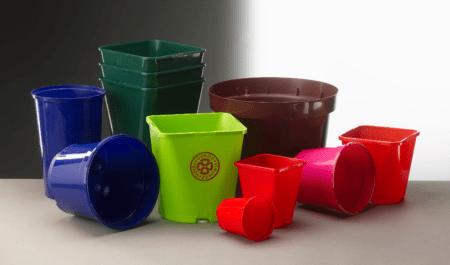
Plastic container manufacturer Aeroplas has launched a polypropylene plant pot range which it says is suitable for recycling collections from households.
The ‘Eco Pot’ range was created in order to “move forward” the company’s beliefs that its plant pots should be included with kerbside collections.
The Tipton-based company describes itself as a “leading manufacturer of shrub containers, thermo pots and transport trays”. To prove the range was recyclable, the company last month provided plastics trade body RECOUP with samples of plant pots manufactured from 100% reprocessed carbon-free polypropylene for testing.
Carbon pigment plastic products of all colours absorb Infra-Red from detection systems, which makes sorting for recycling of these products much harder. The company say that by making the carbon-free pots, they will get through the system and can be reprocessed providing they are clean.
Tests were carried out on samples at the TOMRA testing centre in December 2017. The samples comprised of 8 different colours, including black, and were 100% correctly identified as polypropylene by sorters.
While 76% of local authorities collect pots, tubs and trays, there are only a handful who collect plant pots as part of a kerbside collection service. Some independent garden centres do offer a pot recycling service but issues around the quality of material due to cleanliness has made some pots difficult to re-use.
Also, many plastic gardening bedding packs are black which has been difficult to detect at sorting facilities. Aeroplas say that by making the products carbon-free, this has enabled them to be detected and thus more easily recycled.
RECOUP chief executive Stuart Foster commented that he sees “no reason” why the pots shouldn’t be included in household recycling collections and hopes it will send out a positive message.
“This is Aeroplas saying to the leadership that an ideal solution for an industry roll-out of pot collections is needed, alongside UK local authorities changing the message it delivers to recyclers to explain that plant pots can be recycled. The release doesn’t resolve all issues at once but does help show that at least some plant pots can be recycled effectively.
Mr Foster added that sometimes when manufacturers stop using black-plastic packaging, it still contains carbon-pigment so can sometimes not get through the system so it is not always a case of just changing the colour of plastics.
He said: “You have to look at what pigment is used which can be difficult. Whenever this pot goes in it will go through the system and is now for rest of industry to adopt the same principles. We need evidence it will get through and be recycled.”
Aeroplas say it will continue to develop the pots over the coming months and are “delighted that they can prove that not all plastic packaging should be seen in a negative light."